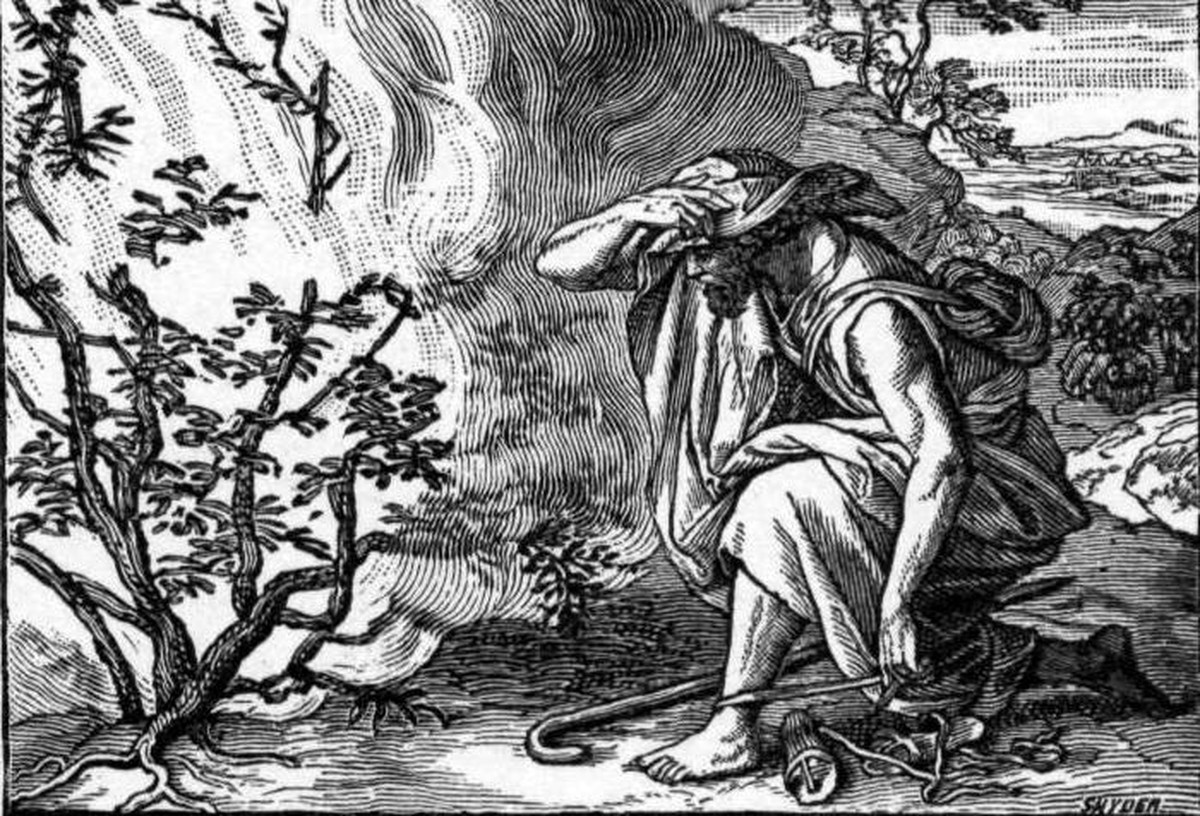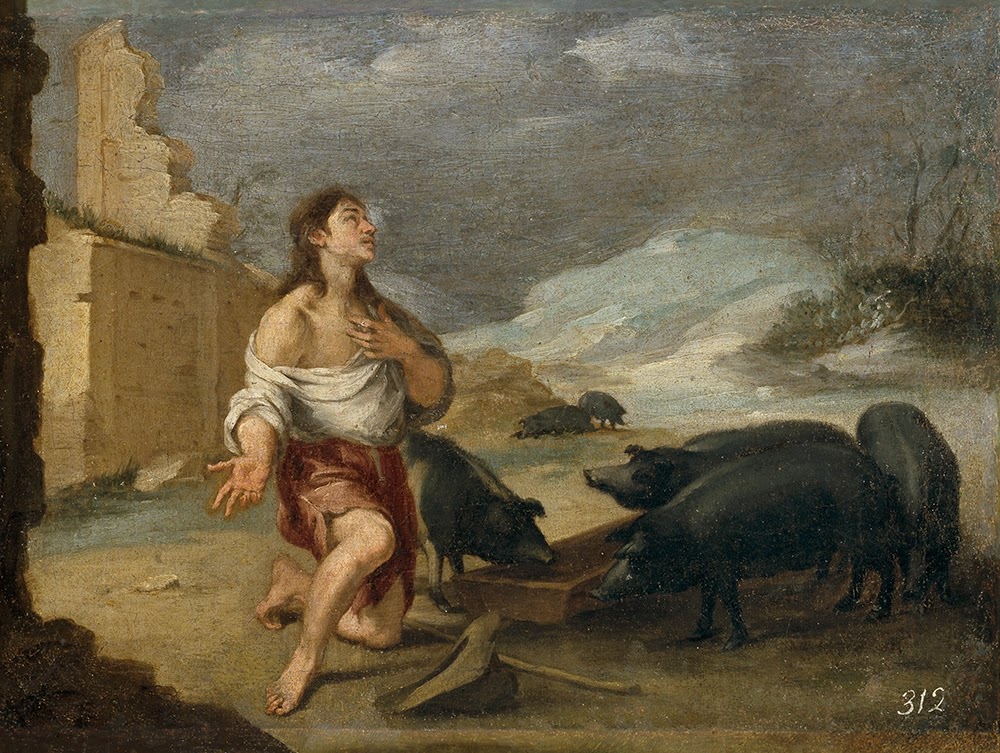3rd Sunday of Lent (C)
Does God want us to be happy? We may instinctively say, “Yes, I know God wants me to be happy,” but our day-to-day experience of being unhappy (in whatever form that takes for each of us) may lead us to think otherwise. We might try to explain away our unhappiness in the present moment in one of two ways. Perhaps we believe that God wants us to be happy, but he won’t let us be happy because of our sins. Or, perhaps we think that God wants us to be happy, but only in the next life and not in this one. When I’m feeling blue, I tend to put both together and think that God won’t let me be happy because of my sins, but happiness will be my reward in the life of the world to come – please God, I make it there.
Each of these attempts to explain the reality of our unhappiness despite God’s desire for us to be happy are, what we call half-truths. Taken as absolutes they’re false, but there’s a hint of truth in them. That hint of truth, however, is mixed with insidious lies – lies that the evil one, the father of lies, wants us to believe to lure us away from God, who is the giver of every good and perfect gift.
We should invite the God’s Holy Spirit to speak to us through his Word this morning to remind us of what is true, to welcome his light to shine upon these half-truths, and allow the Spirit of Truth to guide us to affirm what is true in them and to reject what is false.
First, let’s consider the claim that we are unhappy because of our sin. Now, for any of us who have attempted to turn away from sin and be faithful to the Gospel, we know full-well that sin causes unhappiness. Sin is enticing because it presents a good – and we, by instinct, and drawn toward the good – yet, when we sin, we quickly and painfully learn that the good we sought was only a veneer. We chose to sin because we thought it would make us happy, only to realize that sin has, in fact, added to our unhappiness. Sometimes that realization comes immediately; other times it may take quite a while to sink in.
When it comes to sin’s unmistakable effect on our unhappiness, I often think of the description in The Lord of the Rings that Bilbo gives of himself to Gandalf regarding his old age and how long he has lived coveting the Ring. The hobbit says to the wizard, “I feel thin, sort of stretched, like butter scraped over too much bread”. Or, we might also think of Psalm 63, which our parish has been praying together throughout Lent: “For you my soul is thirsting. My body pines for you like a dry, weary land without water.” In addition to my own experience of the miserable place my sin leaves me, I can attest to the dozens of confessions I hear every week which confirm that sin, no matter the variety, always leaves us empty, parched, and barren – synonyms all for unhappiness.
So it would appear that the claim is true: we are unhappy because of our sin. Yet let’s allow the teaching of the First Reading to help us to see more clearly. When we meet Moses in Exodus 3, he is “tending the flock of his father-in-law Jethro” (3:1a). On the surface, that sounds like just a bit of literary exposition, but, in fact, it tells us so much more. Moses, when we meet him, is a shepherd; but he hasn’t always been one. Recall that Moses, although the son of a Hebrew woman, was found in the banks of the Nile by Pharaoh’s daughter and was raised within Pharaoh’s court as a member of his own family. Yet, in a moment of anger, he killed an Egyptian for beating one of the Hebrews and, as this became known, he fled away from Pharaoh into the land of Midian and thus became a shepherd in his father-in-law’s charge. Now, it may sound not so bad to flee the city and take up a more rural life in the country, but in those days, shepherds were utterly despised by the Egyptians, so much so that the Egyptians wouldn’t in any way associate with them. Moses has, then, truly fallen from grace – from where he had all that he could have wanted to a place where he is completely despised. And all of that is on account of his sin, that he killed that brutalizing Egyptian.
Nevertheless, it is in this moment, when Moses has bottomed out, that he “came to Horeb, the mountain of God” (3:1b); and finding the bush on fire yet not consumed, he hears the voice of God cry to him and reveal himself as “the God of your fathers […] the God of Abraham, the God of Isaac, the God of Jacob” (3:6). And although Moses hides his face because of his sin, God still speaks to him and calls him to set free God’s captive people and lead them “out of that land into a good and spacious land, a land flowing with milk and honey” (3:8).
Sin may have deprived Moses of his temporal happiness – his comforts in Pharaoh’s palaces – but it does not hinder the living God from speaking to Moses, calling him into service, and using him to bring the people of Israel into the land promised to them. In fact, it is in the depths of Moses’s sin and the unhappiness it caused that he encounters God. And the God that Moses encounters is not any kind of abstract concept or lofty idea, but a person, who reveals to Moses even his name – a name which reveals the depth of his existence – “I AM”. This encounter establishes a relationship between them, and this relationship gives a new determination for Moses’s life, where he will leave his shepherding of flocks behind (the result of his sin) and instead embrace the grace of his vocation to shepherd the people of God into the land of good and plenty in which God desires his people to be happy.
In light of Moses’s call, we can consider our own. God calls out to us in his mercy, as St. Paul says, while we are still sinners (cf. Rom. 5:8), reveals himself and his name to us, invites us into a relationship with him, and commissions us for service in his Church and in the world. Sin, then, does make us unhappy. Yet God comes to us, while we are sinners, and rescues us from the desperation and misery of our sin by summoning us out of darkness into his own wonderful light. In this light – represented in the light of the burning bush – we come to know God and to know ourselves. Specifically, we come to know that God does not let our sin have the final word. Rather, he makes our sin the first word of his new creation, by transforming our sin to be a means of grace for our redemption and for that of the whole world.
And here we uncover the half-truth of the second claim – that happiness will exist only in the next life and not in this. Christ tells us in the Gospel of John that he has come that we may have life and have it in abundance (cf. Jn. 10:10). As we continue to grapple with sin and the unhappiness it causes, we can be led to believe that Christ’s promise of life will not be ours here on earth. It is true that the happiness we will, please God, know in heaven will be infinitely greater than anything we can imagine here. But here we must let the Gospel sets us aright. The fig tree may now indeed be barren, but that does not mean we should lose hope. At any given moment, we may feel like a tree without fruit, a barren desert, or like butter scraped over too much bread. And this may lure us to think that that’s the just the way it’s going to be. But that is not true. By striving to live out the life God has called us to, we find the capacity not for the fleeting and superficial emotion of happiness, but for the happiness that consists in true and lasting joy. Whether priest or religious, married, consecrated, or still searching, God gives us the capacity, through our vocations, to be fully alive and this life in abundance is the happiness that God desires for us.
Although we are sinners, we can still be happy. We find our happiness not in the enticements of sin, but in the mission of our vocation. We must constantly renew our commitment to our vocations and strive to grow in holiness through the sacraments of penance and the Eucharist for us to know the life and the happiness that God wants for us. May all that we do in this season of Lent draw us closer to the God who calls to us, while still sinners, to have life in abundance.

-1.jpg)


Comments
Post a Comment